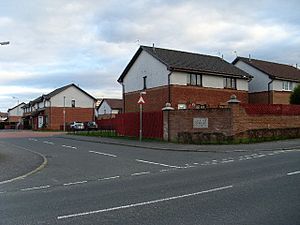Jane Rae facts for kids
Quick facts for kids
Jane Rae
|
|
|---|---|
| Born | 20 December 1872 |
| Died | 12 May 1959 (aged 86) Clydebank, Scotland
|
| Nationality | British |
| Occupation | councillor |
| Employer | Clydebank Council |
| Known for | political activism, women's suffrage, temperance movement, anti-war |
| Spouse(s) | Alfred Coates |
Jane Rae (born December 20, 1872 – died May 12, 1959) was an amazing British woman. She worked hard to make things better for people. Jane was a political activist, which means she worked to change society. She was also a suffragist, fighting for women's right to vote. Later, she became a councillor and a Justice of the peace. Jane was part of a big strike at the Singer Sewing Machine factory in 1911. She also led the local Independent Labour Party and was a councillor for Clydebank.
Contents
Early Life and Moving to Clydebank
Jane Rae was born on December 20, 1872. Her birthplace was a town called Denny in Falkirk, Scotland. Her parents were Elizabeth Cossens and Livingston Rae. Her father worked as an ironmonger, selling metal goods. Later, Jane and her family moved to Clydebank.
Fighting for Workers' Rights
Jane Rae worked at the Singer Sewing Machine factory. This factory was in Kilbowie, Clydebank. She worked in the "Needle Flat" department. Here, workers made and checked sewing machine needles. Jane and her co-workers faced unfair rules. Their wages were cut, and they had more work to do. They also had their work timed very strictly.
The Singer Factory Strike of 1911
Because of these unfair conditions, Jane became an activist. She helped lead a big strike at the factory. This strike lasted from March to April in 1911. For her part in the strike, Jane lost her job. More than 400 other workers also lost their jobs.
Joining the Independent Labour Party
People described Jane as tall, determined, and strong-willed. She was very dedicated to making society better. She wanted to improve conditions for all workers. After hearing a speech by Scottish socialist Keir Hardie, she joined a political group. This group was the Clydebank branch of the Independent Labour Party. By 1913, she became the Branch Secretary.
Working for Change in Society
Jane was very active in the women's suffrage movement. This movement fought for women's right to vote. She even led a talk given by Emmeline Pankhurst. This event took place at Clydebank Town Hall.
Other Important Movements
Jane was also involved in other important movements. She supported the temperance movement, which aimed to reduce alcohol use. She was also part of the anti-war movement. Jane also worked with the cooperative movement. This movement helped people work together for common good. She also helped with the Clydeside Rent Strike. This strike fought against unfair rent increases.
Becoming a Councillor
In 1922, Jane Rae was elected as a Labour Party councillor. She served on the Clydebank Town Council. She held this position until 1928. She was also a Justice of the peace. In this role, she made sure people followed the law. She was known for standing up for women who were treated unfairly.
Later Life and Legacy
In 1929, Jane married her friend Alfred Coates. He was from Australia. They moved to Australia together. In 1938, Jane and Alfred returned to the UK. They settled in the Channel Islands.
Living Through World War II
During World War II, the Channel Islands were taken over by Germany. Jane saw how the Nazis treated Soviet prisoners of war badly. To stay safe, she destroyed all her socialist writings and records.
Returning to Clydebank
In 1946, her husband Alfred passed away. Jane then moved back to Clydebank. She lived there until her death in 1959.
Tributes to Jane Rae
A special plaque was put up in Jane's honor. It is in the gardens of the Town Hall in Clydebank. West Dunbartonshire Council placed it there. When the plaque was revealed, Provost Douglas McAllister spoke. He said Jane was involved in many activities. He praised her determination to help others. He said she cared deeply about her community.
There is also a place named after her. It is called Jane Rae Gardens. This garden is in the Whitecrook housing estate. In 2012, the BBC made a short film. It was about the Singer Sewing Machine factory strike. An actor played Jane Rae and told the story.


